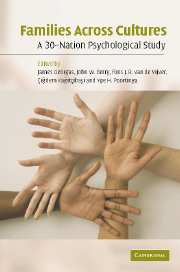Book contents
- Frontmatter
- Contents
- List of figures
- List of tables
- List of contributors
- Acknowledgments
- Prologue
- Part I
- Part II
- 9 The Algerian family: change and solidarity
- 10 Botswana
- 11 The Brazilian jeitinho: Brazil's sub-cultures, its diversity of social contexts, and its family structures
- 12 Britain
- 13 Bulgaria: socialism and open-market economy
- 14 Canada
- 15 Chile: new bottle, old wine
- 16 Cyprus
- 17 Portrait of family in France
- 18 Georgia
- 19 Germany: continuity and change
- 20 Ghana
- 21 Greece
- 22 Hong Kong, SAR China: transitions and return to the motherland
- 23 India
- 24 Indonesia: traditional family in a changing society
- 25 The Iranian family in a context of cultural diversity
- 26 Japan: tradition and change in the Japanese family
- 27 Mexico
- 28 Mongolia: traditions and family portrait
- 29 The Netherlands: tolerance and traditionalism
- 30 Nigeria
- 31 Pakistan: culture, community, and filial obligations in a Muslim society
- 32 The Saudi society: tradition and change
- 33 The South African family
- 34 South Korea
- 35 Spain: tradition and modernity in family structure and values
- 36 Turkey
- 37 Ukraine
- 38 Family in the United States: social context, structure, and roles
- Appendix
- References
- Index
28 - Mongolia: traditions and family portrait
Published online by Cambridge University Press: 10 December 2009
- Frontmatter
- Contents
- List of figures
- List of tables
- List of contributors
- Acknowledgments
- Prologue
- Part I
- Part II
- 9 The Algerian family: change and solidarity
- 10 Botswana
- 11 The Brazilian jeitinho: Brazil's sub-cultures, its diversity of social contexts, and its family structures
- 12 Britain
- 13 Bulgaria: socialism and open-market economy
- 14 Canada
- 15 Chile: new bottle, old wine
- 16 Cyprus
- 17 Portrait of family in France
- 18 Georgia
- 19 Germany: continuity and change
- 20 Ghana
- 21 Greece
- 22 Hong Kong, SAR China: transitions and return to the motherland
- 23 India
- 24 Indonesia: traditional family in a changing society
- 25 The Iranian family in a context of cultural diversity
- 26 Japan: tradition and change in the Japanese family
- 27 Mexico
- 28 Mongolia: traditions and family portrait
- 29 The Netherlands: tolerance and traditionalism
- 30 Nigeria
- 31 Pakistan: culture, community, and filial obligations in a Muslim society
- 32 The Saudi society: tradition and change
- 33 The South African family
- 34 South Korea
- 35 Spain: tradition and modernity in family structure and values
- 36 Turkey
- 37 Ukraine
- 38 Family in the United States: social context, structure, and roles
- Appendix
- References
- Index
Summary
A HISTORICAL OUTLINE OF MONGOLIA
Mongolia is a country with a history that dates back to the times of the Khunnu Empire. Mongolia today still evokes images of Genghis Khan's warriors and the steppe-dwelling nomads who created the world's largest continuous land empire in the thirteenth century. The country is now experiencing the most recent of the many waves of change that have enriched the national culture of Mongols.
Mongolia, which in 1921 became the first socialist country in Asia, saw its state grow very rapidly – extending its influence ever deeper into people's daily lives. In Mongolia, the state owned every cow, sheep, yak, and goat. It owned the enterprises within which people worked. And it repressed any political opposition or alternative ways of thinking – a process that included closing down hundreds of Buddhist monasteries.
Since socialism in the world collapsed Mongolia has chosen its own way of development, and it has been undergoing profound political and socioeconomic changes since 1990. The essence of this process consists of: political democratization; advancement of human rights and fundamental freedoms; transition to a market economy, and vindication of the equality of different forms of property; implementation of an open foreign policy and international activities; recognition of the important role of a rational environmental policy in ensuring sustained development; and revival of the best national traditions in every sphere of life.
- Type
- Chapter
- Information
- Families Across CulturesA 30-Nation Psychological Study, pp. 402 - 409Publisher: Cambridge University PressPrint publication year: 2006
- 1
- Cited by



